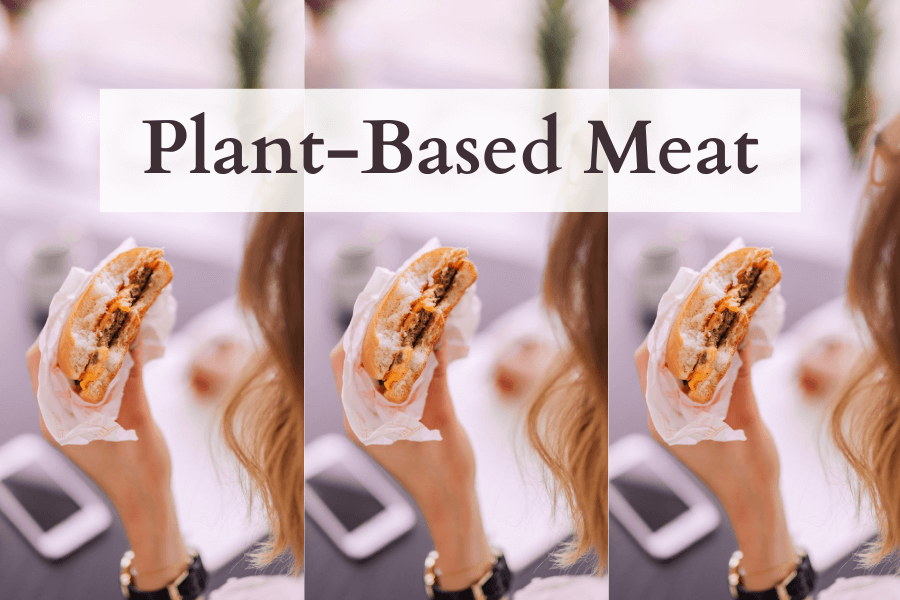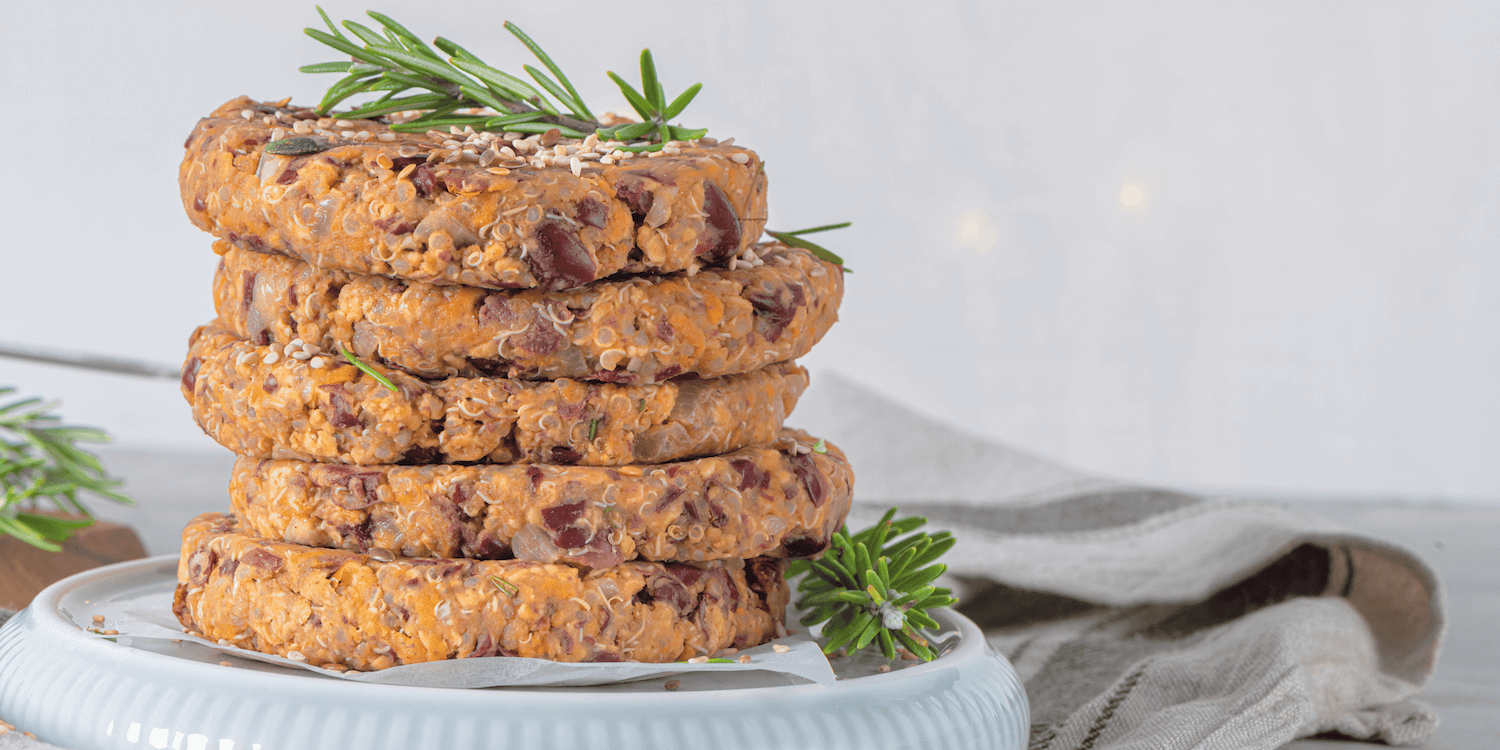America has a big meat problem. Plant-based meat has become “trendy” around the globe and it’s quickly scaling the global food market – from grocery stores to major fast-food chains, like Burger King & McDonald’s. What are the pros and cons of plant-based meat?
While these plant-based alternatives could be solving a major issue found on our plate, are they making another major issue worse? Beyond Meat & Impossible Foods are two of the most popular options… but which is better? Are there healthier alternatives that are even more sustainable?
Keep reading to learn more!

Note: This article contains affiliate links, meaning In On Around will make a small commission at no additional cost to you. This helps me maintain the site. As always, I value full transparency & only work with brands I love and trust.
The Pros & Cons Of Plant-Based Meat
On average, Americans eat 50 billion hamburgers every year. It takes about 58 gallons of water and 41 sq ft of land just to produce one 1/4 pound beef burger. [1] But if you’re thinking of eating alternative meat products, there are many pros and cons to consider!
Pros
- They market themselves to be “better for the environment” compared to conventional factory-farmed meat.
- Uses less water (Beyond Burger uses 99% less water than a beef burger).
- Uses less land (Beyond Burger uses 93% less land).
- Less energy required (46% less energy for Beyond Burger).
- Less greenhouse gas emissions (90% fewer emissions with Beyond Burger).
- Important distinction: these are compared to factory-farmed meat… not regeneratively farmed meat.
- They are helping to transition meat-eaters away from meat & to more plant-based meals.
- Uses less feed inputs (plant-based burgers use significantly less corn & soy than a traditional beef burger. Globally over 3/4 of all soy is fed directly to livestock.)
- There is less antibiotic use (about 75% of all antibiotics are used in factory farming).
Cons
- Many plant-based meat alternatives are filled with processed & genetically engineered ingredients, which can negatively impact our health.
- Read more about GMOs here: 13 Pros And Cons Of GMOs (Backed By Evidence)
- Many fake meats are high in sodium, saturated fats, and added sugar – they’re highly processed. Always check the ingredient label if you’re trying to limit sodium intake.
- Many meat alternatives contain wheat gluten, which can be inflammatory to the gut.
- Read more about gluten here: Gluten-Free Diet Pros And Cons For Non-Celiacs
- They encourage mono-crop farming (like GMO soy, wheat, and corn), which can damage the environment and biodiversity.
- They use inflammatory oils that can be harmful to your health (like canola oil).
- Read more about seed oils here: Seed Oils & Inflammatory Oils To Avoid While Cooking
- Many meat alternative products are owned by large, big-agriculture corporations.
- They discourage buying high-quality, ethical meat from regeenrative farming sources, like organic pasture-raised farms.

What Ingredients Are In Vegetarian Meats?
Beyond Meat Ingredients
Water, Pea Protein, Expeller-Pressed Canola Oil, Refined Coconut Oil, Rice Protein, Natural Flavors, Cocoa Butter, Mung Bean Protein, Methylcellulose, Potato Starch, Apple Extract, Pomegranate Extract, Salt, Potassium Chloride, Vinegar, Lemon Juice Concentrate, Sunflower Lecithin, Beet Juice Extract (for color)
Important Notes On Beyond Meat
- GMO-free (which is good, but it’s not organic)
- 20 grams of plant protein (higher than beef)
- Canola oil is highly inflammatory in the body, can harm memory, & can increase body weight. [2, 3] It’s especially found amongst highly processed foods.
- Natural Flavors is an umbrella term for a long list of chemical additives – it’s best to avoid this whenever possible.
Impossible Foods Ingredients
Water, Soy Protein Concentrate, Coconut Oil, Sunflower Oil, Natural Flavors, 2% Or Less Of: Potato Protein, Methylcellulose, Yeast Extract, Cultured Dextrose, Food Starch Modified, Soy Leghemoglobin (heme), Salt, Mixed Tocopherols (Antioxidant), Soy Protein Isolate, Vitamins and Minerals (Zinc Gluconate, Thiamine Hydrochloride (Vitamin B1), Niacin, Pyridoxine Hydrochloride (Vitamin B6), Riboflavin (Vitamin B2), Vitamin B12)
Important Notes On Impossible Foods
- Uses genetically engineered heme (from soy leghemoglobin). This source of heme has limited data regarding health effects in the long term.
- 19 grams of protein (the same as ground beef).
- Non-organic soy is genetically modified and glyphosate/pesticide-ready. Always opt for organic soy whenever possible.
- Related Post: Glyphosate – What You Need To Know
There’s a reason these fake meats are being sold as fast food.
They’re food-like products… not real food!
Are There Dangers Of Plant-Based Meat Products? Is Plant-Based Meat Healthy?
Artificial meat products can be classified as ultra-processed food. While probably the lesser of two evils when compared to factory-farmed beef, neither should be classified as a “health food.” Is either option truly healthy? Nope.
Oftentimes these plant-based meat burgers appear healthier when in reality they simply cannot compare to whole foods plant-based burgers, like with beans and quinoa. If your gut is particularly sensitive to processed foods, it would be best to avoid these altogether since they may be difficult to digest.
I recently attended an event with Impossible Foods and the Head of Impact Strategy said it herself: “plant-based meat is not a health food.” However, meat itself should also not be classified as a health food. In terms of sustainability, fake meat is far superior to factory-farmed meat.
Plant-based meat is not a health food.
What Should You Opt For Instead of Plant-Based Meat Alternatives?
The “mock meat” options were created to influence the eating patterns of traditional meat-eaters… they’re not marketed specifically for vegetarians and vegans (such as myself, who are already content with delicious bean burgers). There are plenty of healthy options to replace your beef burger:
- Organic tofu (can crumble up to mimic ground beef – great in tacos)
- Organic tempeh
- Black-bean burger (great with quinoa & brown rice)
- Jackfruit (has a similar consistency to pulled pork)
Incorporating real, whole foods, plant-based meals into your diet is the best option. Eating a diet rich in fresh, organic fruit, vegetables, grains, nuts, legumes etc… is the healthiest option. In other words, always look for the least processed options. These are yummy vegetarian-friendly options!
Always look for the brands that are the least processed.
If you insist on eating a plant-based burger that tastes like meat, opt for the Beyond Burger instead of Impossible Foods. It’s slightly less processed than Impossible Foods, but it’s certainly not the healthiest plant-based meat. Only eat these in moderation – they’re not a “health food.” Will eating these occasionally cause major issues in your health? No, probably not! As long as these are eaten every now and then, it’s not the end-all-be-all.
In addition, I avoid the brand Quorn, which is a meat substitute made of fermented fungus (mycoproteins). Many people link these to allergic reactions and gastrointestinal issues – hard pass! [4]

How To Find High-Quality Meat
If you’re a meat-eater, only eat meat if it’s…
- Organic
- Pasture-raised
- Grass-fed & grass-finished
- Humanely Raised
- Local (whenever possible)
I discuss processed meat (and the best brands) here: What Is The Healthiest Lunch Meat? Processed Meat 101
If you eat meat, support the farmers who are doing it right with regenerative agriculture (aka farming in the most natural way possible)! You don’t need to eat meat at every meal. In reality, most diets should consist of 80%+ plants. In fact, diets high in red & processed meats show an increased risk for cancer, cardiovascular disease, type 2 diabetes, death & more. [5] A predominantly plant-based diet is the way to go!
Plant-based fake meats are not a “health” food, while high-quality pasture-raised animal-based meat is. The health benefits of high-quality meat outweigh fake meat-like products.
- Related Post: 14 Heart-Healthy Tips – a must-read if you have heart disease, weight-management issues, or care about your heart health.
Support organic, pasture-raised farmers and regenerative agriculture!
The Bottom Line On Plant-Based Meat:
Americans need to eat less meat... but when we do it meat, it should be authentic and ultra-high-quality. The way animals are conventionally raised for meat today is completely unsustainable, unethical, and unhealthy. Without a doubt, the factory-farmed meat industry is destroying our planet, waterways, air & more – we absolutely need change.
It’s time we boycott factory-farmed food! To clarify, as conscious consumers, we have the ability to vote with our dollars. The less you support Big Ag, the less money they have to continue destroying our planet.
We must boycott factory farming (especially low-quality meat and dairy products)!
Should You Eat Meat Substitutes?
Will I personally eat it? No way. While it’s a step closer to a plant-based & more sustainable future, truly whole foods plant-based burgers are far superior. I’ll stick to the organic bean burgers or pasture-raised regeneratively-farmed meat… and you should too.
Frequently Asked Questions
Click on the below FAQs to learn more about the pros and cons of plant-based meat!
What is the best way to eat?
What's the healthiest type of meat?
Do Americans eat too much meat?

Yes, Americans eat too much meat. The way animals are conventionally raised for meat today is completely unsustainable, unethical, and unhealthy. Factory-farmed meat is destroying our planet, waterways, air & more – we absolutely need change. Support farmers with pasture-raised, organic, regeneratively-farmed meat.
Do you eat plant-based meat alternatives?
Do you agree with these pros and cons of plant-based meat? There are plenty of vegetarian-friendly alternatives that aren’t full of nasty ingredients.
Let me know your thoughts! You can watch our web story here.
xoxo,

Want to read more? Check out my other articles here!
Additional information from: Beyond Meat, Impossible Foods, Cleveland Clinic, Food Safety News, Our World In Data, Regeneration International, World Health Organization, American Heart Association (AHA)
Copyright In On Around LLC 2021 ©. In addition, the statements made on this website have not been evaluated by the FDA (U.S. Food & Drug Administration). Therefore, they are not intended to diagnose, treat, cure, or prevent any disease. Similarly, the information provided by this website should not be used as individual medical advice. In addition, you should always consult your doctor for individual recommendations and treatment.


